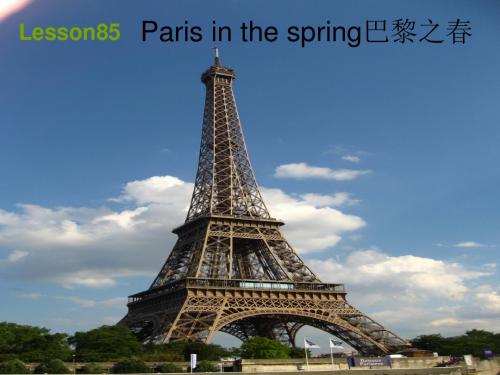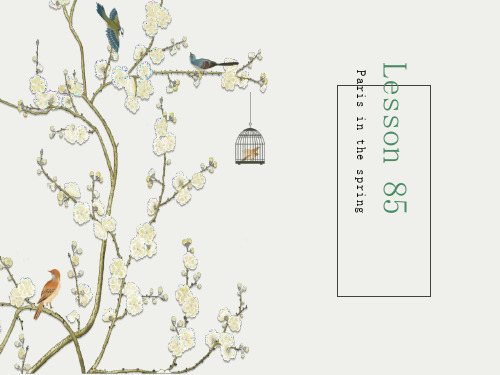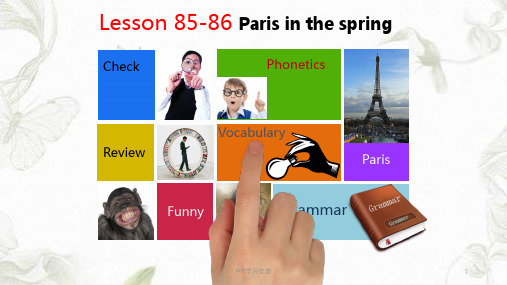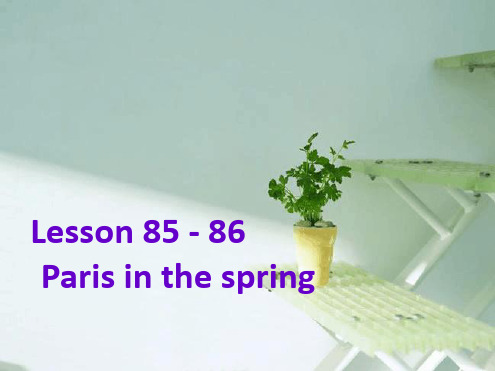新概念英语第一册第85-86课课件
合集下载
新概念英语第一册第85-86课课件幻灯片课件

beautiful: Music: You are beautiful
“美丽”,比较正式,可以用于girls,也可以用于
ladies
Music: Pretty boy
pretty:
较口语化,常用来形容未婚(特别是花季的女孩
子)漂亮中透出可爱,情侣间常用
cute:
口语:漂亮(侧重于小女孩的可爱)
good-looking:
I’ve just been to the library.
have been to 与 have gone to 的区别:
have been to 表示曾经去过某地,已经回来了; have gone to 表示去了某地,还没有回来(可能在路上, 可能还在那里); 如: ① My father has been to Beijing many times. 我父亲去过北京许多次了。(画外音:已经从北京回来了。)
7. Mr Chen _g_a_v_e__(give)up smoking last year. 8. _H__a_v_e_ you ever _r_i_d_d_e_n_(ride) a horse? Never. 9. He _h_a_s_k_e_p_t_( keep) the book since two days ago.
新概念英语第一册第85-86课课 件
4. I h_a_v_e__r_e_a_d (read) the novel twice. It’s interesting. 5. She _h_a_s_g_o_n_e_(go) to Pairs, hasn’t she? Yes.
How _d_i_d___ she _g_o_____(go) there? She _w_e__n_t __(go) there by air.
新概念英语第一册第85-86课课件教材

He saw the film on television last year.
GEORGE: Hello, Ken. just刚刚,刚才 KEN: Hi, George.
GEORGE: Have you just been to the
cinema?
KEN:
Yes, I have.
have/has been to 去过已回 have/has gone to 去了未回
Lesson 85 - 86 Paris in the spring
动词填空:
1._H_a_v_e_ you _c_le_a__n_e_d_(clean) the room? Yes, we_h_a_v_e__d_o_n__e_(do) that already. When __d_id____ you __d_o___(do) it? We __d__id___(do) it an hour ago.
★cinema /'sinəmə/ n.电影院 theatre 剧院,戏院
We go to the__ci_n_e_m_a__to see the film. We go to the__th_e_a_t_re__to see the play.
★film n.
(1)(c)n.电影
film movie
2._H__a_s__ he _s_e__e_n_(see) this film yet? Yes. When _d_i_d__ he _s_e_e__(see) it? He __s_a_w__ it last week.
3. How many times h__a_v_e_you_c_o_m__e_(come) here?
Questions:
GEORGE: Hello, Ken. just刚刚,刚才 KEN: Hi, George.
GEORGE: Have you just been to the
cinema?
KEN:
Yes, I have.
have/has been to 去过已回 have/has gone to 去了未回
Lesson 85 - 86 Paris in the spring
动词填空:
1._H_a_v_e_ you _c_le_a__n_e_d_(clean) the room? Yes, we_h_a_v_e__d_o_n__e_(do) that already. When __d_id____ you __d_o___(do) it? We __d__id___(do) it an hour ago.
★cinema /'sinəmə/ n.电影院 theatre 剧院,戏院
We go to the__ci_n_e_m_a__to see the film. We go to the__th_e_a_t_re__to see the play.
★film n.
(1)(c)n.电影
film movie
2._H__a_s__ he _s_e__e_n_(see) this film yet? Yes. When _d_i_d__ he _s_e_e__(see) it? He __s_a_w__ it last week.
3. How many times h__a_v_e_you_c_o_m__e_(come) here?
Questions:
新概念英语第一册85-86课ppt课件

注意 (变疑问句时already要变为yet)
最新版整理ppt
11
• Just like London!
• = The weather in Paris in spring is just like the weather in London in spring.
• 这里的just是“就、正好、恰恰”的意思。 【比较上文】
最新版整理ppt
5
现在完成时的特殊结构
• have/has been to a place 曾经去过某地,但现在不在那个地方了 I have been to Beijing.(以前去过)
• have/has gone to a place 已经去那个地方或正在去的路上,到达与 否不确定
• Bill has gone to Beijing.
• ever 通常用于疑问句中,表示“曾经、在
任何时候”。
最新版整理ppt
10
• 我从来没去过西班牙。 • I have never been to Spain. • 你曾经去过西班牙吗? • Have you ever been to Spain? • It rained all the time. 一直、始终(同义句) = The rain never stopped. I have already read this book.(变疑问句 ) Have you read this book yet?
• 我读过那本书。 I have read this book.
• 我昨天读的。 I read it yesterday.
• 它是本老书,但是还是很有趣。
• It’s old, but it’s very interesting.
新概念第一册lesson85-86 Paris in the spring幻灯片课件

Have you just been to the cinema? 你刚刚去过电影院吗? 这是一个现在完成时态的一般疑问句。
just : 刚刚,刚才,现在完成时态的标志 词之一
Have you just been to the cinema? 把这句话变为肯定句: I have just been to the cinema. 你刚刚去了电影院。
I was there last month. I went to Paris last year.
现在完成 时
过去发生的 事对现在的 影响,或从 过去一直持 续到现在的 动作或状态
have/has +过去分词
already, just (肯定句中); never(肯定句 中表否定); ever(疑问句中)
Lesson 85-86 Paris in the spring
1. PCahreicsk /'pæ ris/ n. P巴hon黎etics
2. cinema /'sinimə/ n. 电影院
3. film /film/ n. 电影
4. beautiful /'bjVuo:ctaibfuulal/ry adj. 漂亮的
• Yes,he did.
• 4.At At what time of year did Ken visit Paris?
• He was there in April.
• 5.What’ s the weather like in Paris in spring?
• The weather was awful.
I have already read this book. I read it yesterday. It’s an old book, but it’s interesting.
新概念英语第一册第85-86课课件 (共26张PPT)

Washington 华盛顿(美国首都)
cinema n.电影院 We are going to the cinema tomorrow. 明天我们打算去电影院。
theatre 剧院,戏院
a film star 电影明星/watch/see the film 看电影
例如: We go to the________to see a film. We go to the________to see a play.
film
cinema
new words Paris n. 巴黎
cinema n.电影院
film
n.电影
beautiful adj.漂亮的
city
n城市
never adv.从来没有
ever adv.在任何时候
Paris 巴黎(法国首都)
London 伦敦 (英国首都)
Tokyo 东京 (日本首都)
中表示“以往任何时候”、“曾经”、“在任何 时候”、“从来”这类的意思。
have been to a place与have gone to a place 的区别
have been to: 表示曾经去过某 地,但现在不在 那了,去而已归, 人现在在哪里不 知道。
have gone to: 表示已经去某 地了,现在在 那个地方或正 在去的路上, 去而未归。
Homework
1. To finish the exercises after the text. 2. To practise the structures learned during the class.
A new film is now on. 今天晚上电视上有什么节目?
What’s on television tonight?
cinema n.电影院 We are going to the cinema tomorrow. 明天我们打算去电影院。
theatre 剧院,戏院
a film star 电影明星/watch/see the film 看电影
例如: We go to the________to see a film. We go to the________to see a play.
film
cinema
new words Paris n. 巴黎
cinema n.电影院
film
n.电影
beautiful adj.漂亮的
city
n城市
never adv.从来没有
ever adv.在任何时候
Paris 巴黎(法国首都)
London 伦敦 (英国首都)
Tokyo 东京 (日本首都)
中表示“以往任何时候”、“曾经”、“在任何 时候”、“从来”这类的意思。
have been to a place与have gone to a place 的区别
have been to: 表示曾经去过某 地,但现在不在 那了,去而已归, 人现在在哪里不 知道。
have gone to: 表示已经去某 地了,现在在 那个地方或正 在去的路上, 去而未归。
Homework
1. To finish the exercises after the text. 2. To practise the structures learned during the class.
A new film is now on. 今天晚上电视上有什么节目?
What’s on television tonight?
新概念英语第一册85-86课课件

Lesson 85
Paris in the spring
单词学习
壹
现在完成时的特殊结构
貳
课文讲解
叁
练习
肆
口语练习
陆
日常用语
伍
本课内容
单词学习
never adv. 从来没有
beautiful adj. 漂亮的
cinema n. 电影院
现在完成时专项训练
现在完成时练习题L85-86.doc
homework
背诵本课文,抄写本课单词3英1汉1听写。 完成本课练习册。 每天听录音读课文10分钟. 整理语法到语法本上背过。 听写改错。 预习L87-88,单词6英1汉,读熟。
单击此处添加大标题内容
Hello , Ken. Hi , George. Have you ____ ___ ___the cinema? Yes , ___ __. What ‘s _____? ‘Paris in the Spring’. Oh , I’ve ____ ____it . I ___ ___ ___ ___last year . It’s an ___ ___, but it’s ___ ___.
课文讲解
Have you just been to the cinema?
现在完成时,表示去过某地而现在已经回来了。
这里的just是“刚刚,刚才”的意思。
What’s
有一个新电影正上演。
A new film is now on.
今天晚上电视上有什么节目?
6
never 通常用于陈述句中,表示“绝不、从来没有”。
7
ever 通常用于疑问句中,表示“曾经、在任何时候”。
8
我从来没去过西班牙。 I have never been to Spain. 你曾经去过西班牙吗? Have you ever been to Spain? It rained all the time. 一直、始终(同义句) = The rain never stopped. I have already read this book.(变疑问句 ) Have you read this book yet? 注意 (变疑问句时already要变为yet)
Paris in the spring
单词学习
壹
现在完成时的特殊结构
貳
课文讲解
叁
练习
肆
口语练习
陆
日常用语
伍
本课内容
单词学习
never adv. 从来没有
beautiful adj. 漂亮的
cinema n. 电影院
现在完成时专项训练
现在完成时练习题L85-86.doc
homework
背诵本课文,抄写本课单词3英1汉1听写。 完成本课练习册。 每天听录音读课文10分钟. 整理语法到语法本上背过。 听写改错。 预习L87-88,单词6英1汉,读熟。
单击此处添加大标题内容
Hello , Ken. Hi , George. Have you ____ ___ ___the cinema? Yes , ___ __. What ‘s _____? ‘Paris in the Spring’. Oh , I’ve ____ ____it . I ___ ___ ___ ___last year . It’s an ___ ___, but it’s ___ ___.
课文讲解
Have you just been to the cinema?
现在完成时,表示去过某地而现在已经回来了。
这里的just是“刚刚,刚才”的意思。
What’s
有一个新电影正上演。
A new film is now on.
今天晚上电视上有什么节目?
6
never 通常用于陈述句中,表示“绝不、从来没有”。
7
ever 通常用于疑问句中,表示“曾经、在任何时候”。
8
我从来没去过西班牙。 I have never been to Spain. 你曾经去过西班牙吗? Have you ever been to Spain? It rained all the time. 一直、始终(同义句) = The rain never stopped. I have already read this book.(变疑问句 ) Have you read this book yet? 注意 (变疑问句时already要变为yet)
新概念第一册 Lesson85--86课件

PPT学习交流
10
★ cinema /'sinimə/ n.电影院 theatre /'θiətə/ n.剧院,戏院
We go to the__ci_n_e_m__a_to see a film. We go to the__th_e_a_t_r_e_to see a play.
PPT学习交流
11
PPT学习交流
24
KEN: Paris is a beautiful city. GEORGE: I've never been there.
Have you ever been there, Ken? KEN: Yes, I have. I was there in April.
in April 月份前面不用冠词
cinema?
KEN: Yes, I have.
have/has been to 去过已回 have/has gone to 去了未回
PPT学习交流
16
Have you just been to the cinema? 你刚刚去过电影院吗? 这是一个现在完成时态的一般疑问句。
just : 刚刚,刚才,现在完成时态的标志 词之一
in spring / summer / autumn / winter 在季节前不用加任 何冠词‘Paris in the spring 本课是特指巴黎的一个春天
,所以加了定冠词 the。
PPT学习交流
21
I saw her on TV.
---Where is your book? ----It’s on the TV
Lesson 85 Paris in the spring
PPT学习交流
新概念英语第一册第85 86课课件教材

He did a beautiful job of painting the desk .
?beauty n. 美人,美景,美好的东西
?beautiful ly adv. 美丽地 eg.She dance s_b_e_a_u_ti_fu_l_l_y ( beautiful ).
?eg. 例如
漂亮的 知多少?
ቤተ መጻሕፍቲ ባይዱ
beautiful : Music: You are beautiful
“美丽”,比较正式,可以用于 girls,也可以用于
ladies
Music: Pretty boy
pretty :
较口语化,常用来形容未婚(特别是花季的女孩 子)漂亮中透出可爱,情侣间常用
cute :
口语:漂亮(侧重于小女孩的可爱)
He saw the film on television last year.
GEORGE: Hello, Ken. just刚刚,刚才 KEN: Hi, George.
GEORGE: Have you just been to the
2._H__a_s__ he __s_e_e_n_(see) this film yet? Yes. When _d_i_d__ he __s_e_e_(see) it? He __s_a_w__ it last week.
3. How many times _h_a_v_e_you__c_o_m__e(come) here?
good-looking :
貌美,漂亮,好看,多用于形容成熟女性(舞会 及宴会上常用)
handsome :
这个漂亮是用来形容男士的,指“英俊,潇洒”
never & ever
?beauty n. 美人,美景,美好的东西
?beautiful ly adv. 美丽地 eg.She dance s_b_e_a_u_ti_fu_l_l_y ( beautiful ).
?eg. 例如
漂亮的 知多少?
ቤተ መጻሕፍቲ ባይዱ
beautiful : Music: You are beautiful
“美丽”,比较正式,可以用于 girls,也可以用于
ladies
Music: Pretty boy
pretty :
较口语化,常用来形容未婚(特别是花季的女孩 子)漂亮中透出可爱,情侣间常用
cute :
口语:漂亮(侧重于小女孩的可爱)
He saw the film on television last year.
GEORGE: Hello, Ken. just刚刚,刚才 KEN: Hi, George.
GEORGE: Have you just been to the
2._H__a_s__ he __s_e_e_n_(see) this film yet? Yes. When _d_i_d__ he __s_e_e_(see) it? He __s_a_w__ it last week.
3. How many times _h_a_v_e_you__c_o_m__e(come) here?
good-looking :
貌美,漂亮,好看,多用于形容成熟女性(舞会 及宴会上常用)
handsome :
这个漂亮是用来形容男士的,指“英俊,潇洒”
never & ever
- 1、下载文档前请自行甄别文档内容的完整性,平台不提供额外的编辑、内容补充、找答案等附加服务。
- 2、"仅部分预览"的文档,不可在线预览部分如存在完整性等问题,可反馈申请退款(可完整预览的文档不适用该条件!)。
- 3、如文档侵犯您的权益,请联系客服反馈,我们会尽快为您处理(人工客服工作时间:9:00-18:30)。
② My father isn’t in. He has gone to Beijing. 我父亲不在,他去北京了。
(画外音:他还在北京,没有回来。)
GEORGE: What's on? ———— KEN: 'Paris in the spring'. GEORGE: Oh, I've already seen it. I saw it on television last year. be on 是上演的意思, It's an old film, 也可理解成在荧幕上 but it's very good.
I’ve just been to the library.
have been to 与 have gone to 的区别:
have been to 表示曾经去过某地,已经回来了;
have gone to 表示去了某地,还没有回来(可能在路上, 可能还在那里);
如:
① My father has been to Beijing many times. 我父亲去过北京许多次了。(画外音:已经从北京回来了。)
② adj. 出色的,完美的;令人愉悦的 他油漆了书桌,活干得很漂亮。 He did a beautiful job of painting the desk. beauty n. 美人,美景,美好的东西
beautifully adv. 美丽地 eg.She dances_________ beautifully (beautiful). eg. 例如
"漂亮的" 知多少?
beautiful: Music: You are beautiful “美丽”,比较正式,可以用于girls,也可以用于 ladies Music: Pretty boy pretty: 较口语化,常用来形容未婚(特别是花季的女孩 子)漂亮中透出可爱,情侣间常用 cute: 口语:漂亮(侧重于小女孩的可爱) good-looking: 貌美,漂亮,好看,多用于形容成熟女性(舞会 及宴会上常用) handsome: 这个漂亮是用来形容男士的,指“英俊,潇洒”
现在完成 过去发生 的事对现 时
在的影响, 或从过去 一直持续 到现在的 动作或状 态
have/has +过去分词
already, just (肯定句中); never(肯定句 中表否定); ever(疑问句中)
in April 月份前面不用冠词
I’ve never been there. 我从未去过。
Have you ever been there, Ken? 肯,你去过吗?
never: 从来没有,用于肯定句中表否定,表示绝不,从来没有。 ever: 在任何时候,用于疑问句,表示曾经,在任何时候。 never 和 ever 都是完成时态的标志词。
Please enjoy the video and then answer the questions on the right:
Questions:
1. When was ken in Paris? He was in Paris in April. 2.What was the weather like in Paris? The weather was awful. It rained all the time. 3. When and how did George see the film? He saw the film on television last year.
对划线部分提问
1. I’ve already had dinner.
What have you already done?
2. He has just finished his homework.
What has he just done?
3. Mum has cooked the dinner.
Have you just been to the cinema?
你刚刚去过电影院吗? 这是一个现在完成时态的一般疑问句。 just : 刚刚,刚才,现在完成时态的标志词之一 把这句话变为肯定句: You have just been to the cinema.
你刚刚去了电影院。
仿照例句:
我刚刚去了图书馆。
GEORGE: Hello, Ken. just刚刚,刚才 KEN: Hi, George. GEORGE: Have you just been to the cinema? KEN: Yes, I have.
have/has been to 去过已回 have/has gone to 去了未回
I have already read this book.
I read it yesterday.
It’s an old book, but it’s interesting.
KEN: Paris is a beautiful city. GEORGE: I've never been there. Have you ever been there, Ken? KEN: Yes, I have. I was there in April.
come 3. How many times have _____you______(come) here?
Once.
4. I have ________ read (read) the novel twice. It’s interesting. has gone (go) to Pairs, hasn’t she? Yes. 5. She ________
仿照例句:
他从来没有去过北京。
He has never been to Beijing. 你以前去过北京吗? Have you ever been to Beijing?
GEORGE: Pairs in the spring, eh? KEN: It was spring, but the weather was awful. It rained all the time. GEORGE: Just like London! 〓 The rain has never
in spring / summer / autumn / winter 在季节前 不用加任何冠词‘Paris in the spring本课是特指巴黎 的一个春天,所以加了定冠 词 the。
• What’s on? 这里的be on是“上演”的意思
有一个新电影正上演。 A new film is now on. 今天晚上电视上有什么节目? What’s on television tonight?
did she _______(go) go How ______ there?
She _______(go) there by air. went gave 7. Mr Chen ______(give)up smoking last year.
Have you ever _______(ride) ridden 8. ______ a horse? Never. has kept keep) the book since two days ago. 9. He ________(
did We _______(do) it an hour ago. seen Has he ______(see) 2.______ this film yet? Yes. did he _____(see) see When _____ it? saw it last week. He ______
Lesson 85 - 86 Paris in the spring
动词填空:
Have you ________(clean) cleaned 1._____ the room?
have done Yes, we___________(do) that already. did you ______(do) do When _______ it?
时态
用法
动词形式
时间状语 标志词
例句
一般现在 一般,经 原形/三单 am/is /are; 时 常,习惯, dodoes 真理 一般过去 过去发生 的事,不 时
强调对现 在的影响
every day, I often read always, books. usually, often, He likes music sometimes,
★Paris
/'pæ ris/
n.巴黎
Paris is the capital of France. paris in the spring 巴黎之春 ★cinema
/'sinəmə/ n.电影院 theatre 剧院,戏院
cinema We go to the________to see the film. theatre We go to the________to see the play.
I’ve already seen it.
I saw it on television last year. It’s an old film, but it’s good. 好。 仿照例句:
我已经看过了。
我是去年在电视上看的。 这是部老片子,但很
我已经读了这本书。我是在昨天读的。这是本旧书,但是 很有趣。
never & ever
never 决不, 从不
I will never forget your kindness. 我永远忘不了你的好意。
活到老,学到老。 One is never too old to learn.
ever 曾经,永远,究竟
Have you ever been to Paris? 你去过巴黎吗? 我永远爱你。 I love you for ever. for ever adv. 永远地
